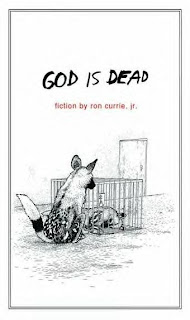> The front cover of this fine small book (official publication date: July 9, 2007) says coyly that it is “fiction.” Is it a collection of stories? Is it a novel? The ambiguity is surely intentional because it’s both, or either, or neither. Viewed as a collection, it’s a marvel: 10 excellent stories all circling a theme of impotence in the face of directionless humans run amok. As a novel, I’d have to say it’s very good, but needs probably one more story to complete the arc of the aftermath of God’s death that is begun brilliantly in the first story, “God is Dead.” The final piece in the book, “Retreat,” makes for a wonderful climax of this tale, but it left me hungry for a denouement, a last chapter that in some way would bring me back to where we started. But that’s quibbling over something that isn’t there; what we have in hand is a joy to read.
The front cover of this fine small book (official publication date: July 9, 2007) says coyly that it is “fiction.” Is it a collection of stories? Is it a novel? The ambiguity is surely intentional because it’s both, or either, or neither. Viewed as a collection, it’s a marvel: 10 excellent stories all circling a theme of impotence in the face of directionless humans run amok. As a novel, I’d have to say it’s very good, but needs probably one more story to complete the arc of the aftermath of God’s death that is begun brilliantly in the first story, “God is Dead.” The final piece in the book, “Retreat,” makes for a wonderful climax of this tale, but it left me hungry for a denouement, a last chapter that in some way would bring me back to where we started. But that’s quibbling over something that isn’t there; what we have in hand is a joy to read.
That first chapter, “God is Dead,” is amazing. The concept is a shock from the first sentence: “Disguised as a young Dinka woman, God came at dusk to a refugee camp in the North Darfur region of Sudan.” After God meets with Colin Powell (a terrifically funny sketch — Powell calls Bush “that redneck son of a bitch” — in an otherwise very serious story), God suffers the perfidy of the Sudanese leaders. In “The Bridge” we see an early consequence of God’s demise, but it turns out there’s much more to come, such as the epidemic nihilism of “Indian Summer” (a very disturbing story), and the effects on those who ate God’s body, in “Interview with the Last Remaining Member of the Feral Dog Pack Which Fed on God’s Corpse.” But as time goes on, the death of God results in massive societal changes, as in “False Idols,” in which the worship of children has become an insurmountable problem, and in “The Helmet of Salvation and the Sword of the Spirit,” where we first learn of the war between the forces of Evolutionary Psychologists and Postmodern Anthropologists. The last story, “Retreat,” reveals the outcome of that war.
Collections of linked stories are harder to pull off than one might think. The linkages here are thematic, in both a macro and a micro sense, and in a few overlapping characters and settings, as well as in style and images. Because of these connections, these are stories that need to be read in order, which for many collections is not the case, and also because of these connections the reader is engaged in an arc that goes beyond any individual story. Which is why I really longed for one more story to round this book out. . .
In any case, I can highly recommend this one. Ron Currie, Jr.’s got a winner. For another review of the book, go here. For an interview with the author, go here. To learn more about the author, visit his website, here.

>I just finished it and pretty much had the same reaction. The first chapter was great! I wished he would continue in that vein. Nonetheless, it was good.